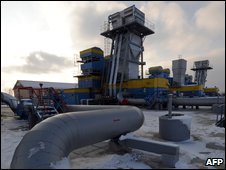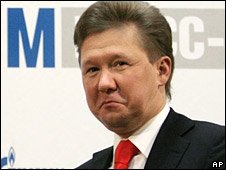
Much of the EU's gas from Russia arrives via Ukraine
|
Russia has stopped all gas supplies to Ukraine after the collapse of talks to end a row over unpaid bills and prices.
Russia's gas giant Gazprom said it turned off the taps at 0700 GMT, when its contract to supply Ukraine ended.
Ukraine insists it has paid off its debts to Gazprom, but Russia contests this. The two countries have also failed to agree on a price for 2009.
The EU urged Russia and Ukraine to resume negotiations and not to let the dispute disrupt supplies to Europe.
A similar row between Gazprom and Ukraine at the beginning of 2006 led to gas shortages in several EU countries.
Pipes across Ukraine carry about a fifth of the EU's gas needs.
 |
Europe's gas pipeline network

|
The new holders of the EU presidency, the Czech Republic, urged the parties to "rapidly reach a successful outcome" to their dispute.
"All existing commitments to supply and transit must be honoured," it added.
Both Russia and Ukraine insist that gas supplies transported via Ukraine to the European Union will continue as normal.
By Thursday evening there were no reports in other countries of reduced supplies.
An official at Gazprom's headquarters in Moscow said: "We have fully cut off supplies to Ukraine as of 10am (0700 GMT) today."
"Usually we supply 390 million cubic metres per day, of which 300 million is transit gas for Europe. Today supplies are running at 300 million cubic metres. We continue supplying Europe in full," Reuters quoted him as saying.
Ukraine's state energy firm Naftogaz confirmed that supplies had dropped off steadily, and said it would start pumping gas from its reserves.
Ukraine says it has built up enough reserves to see it through the next few months.
'Eager for conflict'
Ukrainian President Viktor Yushchenko said he was hopeful that negotiations on a new contract would be completed by 7 January, and that the sides were "close to a compromise".
But there was no sign of similar sentiments in Moscow.
"The debt to Gazprom for gas supplied earlier was not paid. Despite verbal statements from Kiev, Gazprom did not see any money in its account," Gazprom's chief executive Alexei Miller said.
 |
 They have a right to cut the supply if money is not paid. This is the rule of the free market economy
They have a right to cut the supply if money is not paid. This is the rule of the free market economy

|
He criticised Ukraine's stance during the negotiations as "unconstructive", and said Gazprom had no legal reason to continue supplying gas to Ukraine.
Mr Miller said the contract to supply gas depended on the full settlement of �2bn in gas bills and late-payment fines levied by Gazprom.
He also suggested that Kiev was seeking to provoke a wider dispute, saying he was "forming the impression that there are political forces in Ukraine which are very eager to see a gas conflict between our two countries".

Gazprom's Alexei Miller said he blamed Ukraine entirely for the situation
|
Naftogaz said it has paid $1.5bn (�1bn) in outstanding bills to RosUkrEnergo - a Switzerland-registered gas trading company which is acting as an intermediary - but not the fines imposed by Gazprom.
Gazprom is the world's largest gas producer and supplies a quarter of the European Union's gas needs - and 42% of its imports. Most of that is transported via Ukraine.
Russia's Vladimir Putin had earlier warned Ukraine not to disrupt the transit of gas to Europe.
He warned of "very severe consequences" for Ukraine in terms of its relations with both Russia and European countries.
Mr Putin said Gazprom had been generous in offering Ukraine a price of $250 per 1,000 cubic metres of gas in 2009, given that the price in Europe was currently more than $500.
He said he understood that Ukraine was in "a difficult economic situation" which was worse than Russia's, but put the dispute down to a "war of the clans" between the Ukrainian Prime Minister, Yulia Tymoshenko, and President Viktor Yushchenko.
Are you in Ukraine or another European country you fear might be affected by the halt in supplies? How concerned are you about the Russian decision? Send your comments:
In most cases a selection of your comments will be published, displaying your name and location unless you state otherwise in the box below.
The BBC may edit your comments and not all emails will be published. Your comments may be published on any BBC media worldwide.
|
Bookmark with:
What are these?